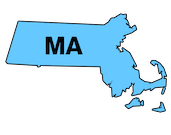Massachusetts
Massachusetts has two principal managed LTSS programs: OneCare and Senior Care Options. In the summer of 2018, the State proposed a Duals Demonstration -- 2.0, combining both programs. Information relevant to all programs is at the bottom of this page.
OneCare
OneCare is a capitated duals demonstration project for adults between the ages of 18 and 64 who are eligible for both Medicare and Medicaid. It operates statewide. Enrollment began in 2013.
Capitation rate categories for the Medicaid portion of OneCare are based on county of residence and a combination of residential setting, level of care need, and diagnosis, as follows:
-
The Facility-Based Care category applies to people institutionalized for longer than 90 days.
-
Five "community" categories apply to community residents and the first 90 days of institutional residency (based on the most recent assessment prior to institutionalization):
-
Very High Community Need is for people with an institutional level of need and a diagnosis of quadriplegia, ALS, muscular dystrophy, or respirator dependence.
-
High Community Need is for others with an institutional level of need.
-
Community Very High Behavioral Need is for those not in the above categories who have both a specified mental health diagnosis (schizophrenia, other psychosis, or episodic mood disorder) and a substance abuse diagnosis that is not in remission.
-
Community High Behavioral Need is for others with either a mental health diagnosis, from the list above, or a substance abuse diagnoses that is not in remission.
-
Community Other is for everyone else.
-
More information
Monthly enrollment reports (includes LTSS participants by setting)
Program documents
Contract with managed care organizations:
Supplemental quality reporting requirements:
Evaluation Design Plan:
Memorandum of Understanding with CMS:
Demonstration proposal to CMS:
2018 Capitation Rates:
2017 Capitation Rates:
2016 Capitation Rates:
Senior Care Options
Senior Care Options (SCO) is a voluntary managed care plan for dual eligibles at least 65 years of age. SCO has been in operation since 2004 under a 1915(a) and (c) Waiver program known as the Frail Elder Waiver.
Capitation rates are based on residential setting (community versus institutional, with the institutional rate only applying after the first 90 days), Medicare coverage (dual versus non-dual), region of the state (greater Boston area versus elsewhere), and a combination of level of need and diagnosis, as follows:
- For community residents (and institutional residents during the first 90 days, who retain their pre-institutional rate), there are three levels:
- Nursing home certifiable.
- Not nursing home certifiable, but with a diagnosis of Alzheimer's, other dementia, or chronic mental illness.
- Everyone else.
- There are also three levels for institutional residents, depending on level of acuity. The lowest, which is greater than all of the community rates, is also applied to the first 90 days after a person has been transitioned from an institution back to the community.
More information
Program documents
Contract with managed care organizations:
Waiver application from 2014 (link to CMS)
For 2014 capitation rates, see Appendix E of the Contract.
Duals Demonstration -- 2.0
This next generation duals demonstration would combine OneCare and Senior Care Options while maintaining the distinct population focus, service package, eligibility, and competency requirements of each of the current programs.
More information
Program Documents
Final Concept Paper, August 2018
General information on Managed LTSS in Massachusetts
Managed Care Quality Strategy:

